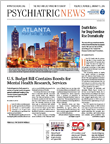The $1.15 trillion omnibus spending bill approved by the House and Senate in mid-December contained a lot of good news and a little not-so-good news for medicine and psychiatry.
The bill included a significant boost in funding for public mental health services and an overall $2 billion increase for the National Institutes of Health.
Several specific items in the budget went to institutes directly concerned with mental health and substance abuse. The National Institute of Mental Health received $1.548 billion, an increase of $85 million over last fiscal year. The National Institute on Drug Abuse got an additional $48 million and the National Institute on Alcoholism and Alcohol Abuse another $20.3 million. An extra $85 million went to the BRAIN Initiative, a major neuroscience research program.
“The current structure of funding across institutes at the National Institutes of Health does not yet align with the burden of disease attributable to the conditions that psychiatrists treat,” said APA President-elect Maria Oquendo, M.D., a professor of psychiatry at Columbia University Medical Center, in an interview. “This spending bill starts to right the imbalance in funding relative to human suffering.”
The Substance Abuse and Mental Health Services Administration (SAMHSA), an agency within the Department of Health and Human Services, received approximately $100 million over 2015’s allocations.
APA also lobbied Congress to continue the Minority Fellowship Programs that support training at APA and other professional mental health groups. In response, the legislators added another $1 million to last year’s $10.6 million funding.
“That programs to increase diversity are the recipients of substantial support reflects the understanding that diversity is important not only because it is the ‘right thing to do’ but because when there is diversity in the workforce, there are different ideas and more innovations that can come forward,” said Oquendo.
Two other high-profile items were also funded. The Mentally Ill Offender Treatment and Crime Reduction Act, administered by the Justice Department, received an additional $1.5 million above 2015 levels (a total of $15 million). The act coordinates services for people with mental illness in the criminal justice system. A few days before, the Senate passed S 993, the Comprehensive Justice and Mental Health Act, introduced by Sens. Al Franken (D-Minn.) and John Cornyn (R-Texas). The
legislation expands services and mechanisms of diversion from the criminal justice system to the mental health system. That legislation now awaits approval by the House of Representatives.
“Steps toward decriminalizing mental conditions will be an essential strategy to ensure that those who suffer from psychiatric diseases can be effectively treated and have a chance of being well,” added Oquendo.
APA also backed an Assisted Outpatient Treatment (AOT) grant provision in the budget bill. States can apply for grants from a $15 million fund to support court processes and provide technical assistance for existing AOT programs.
APA and 67 other medical and public health organizations fell short with another long-sought goal, however. They addressed a letter to Congress urging reversal of the prohibition on gun violence research by the Centers for Disease Control and Prevention (CDC), but the bill did not include funding for such research. The congressionally mandated ban has been in place for two decades, and many organizations and individuals now say that more comprehensive research is needed to find more effective ways to reduce gun violence (
Psychiatric News, January 1).
“As health care providers and public health professionals, we are overwhelmed in our emergency departments, clinics, offices, and communities with the victims of mass shootings, homicides, suicides, accidental shootings, and injuries every day,” said the letter.
“It is very important to be able to do research about prevention of gun violence so that we have evidence-based data on how to intervene to mitigate the current epidemic of gun violence,” said APA President Renée Binder, M.D., a professor of psychiatry at the University of California, San Francisco. “The issue of gun safety and access has become a political and emotional debate, but we need to know what strategies are most important to enact and what works and doesn’t work. Research is essential to inform the debate.” ■
A related article in
Psychiatric News, “Bipartisan Group of Legislators Introduce Justice and Mental Health Bill,” can be accessed
here.
